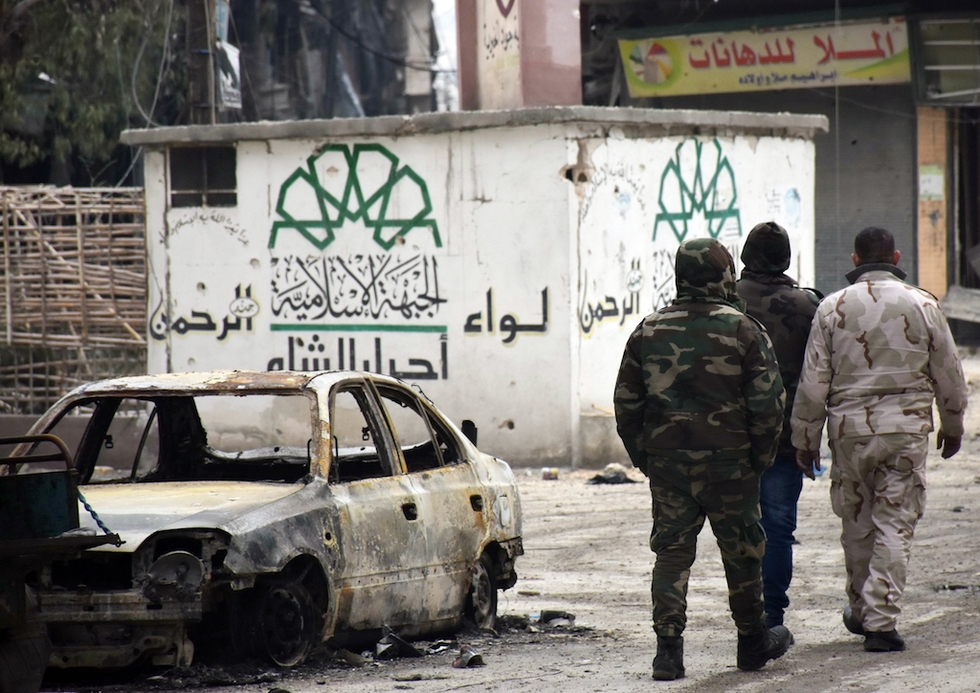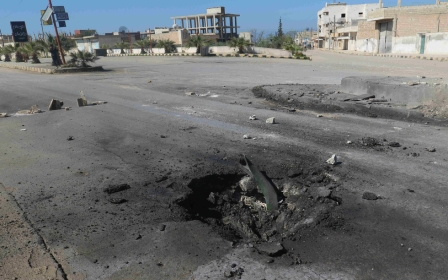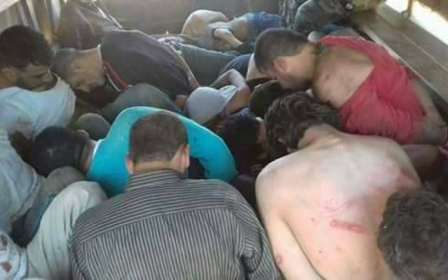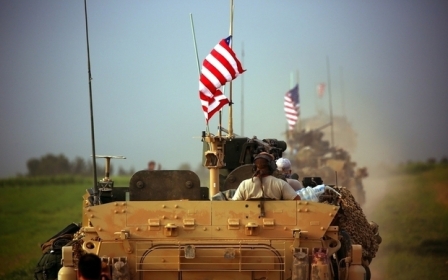Syrian rebels and militants fight for crossing into Turkey

Clashes have intensified between two major opposition groups in Syria with violence spreading to a border crossing with Turkey.
The Hayat Tahrir al-Sham (HTS) coalition, led by former al-Qaeda affiliate Fateh al-Sham (JFS), has been engaged in intense fighting with the Ahrar al-Sham rebel group and various allies, nominally over HTS’s removal of the Syrian revolutionary flag in opposition-controlled areas of Idlib province.
So far, at least 65 people - including 15 civilians - have been killed in the violence which threatens to tear apart the last seams of rebel unity in Syria.
Fighting has spread thoughout the province, spilling over into Aleppo and the Bab al-Hawa border crossing with Turkey.
"The fighting is now inside the crossing. It has become a battlefield, with part of it under Hayat Tahrir al-Sham's control, and part under Ahrar al-Sham's control," said Syrian Observatory for Human Rights director Rami Abdel Rahman.
It’s insane, we want to live in peace, away from war. I wish the truce would be halted soon, so Assad and Russia will kill all those parties
- Abdulsalam Haji Ahmad, resident of Idlib
Ongoing clashes have also prevented emergency evacuations of severely injured patients from inside Syria to Turkish hospitals near the border.
An AFP correspondent in the province also reported heavy clashes on the outskirts of the town of Binnish and attempts by HTS to break into the village of Ram Hamdan.
“We are going to fight until the end,” said Ali al-Omar, the leader of Ahrar al-Sham, in a video published on Twitter.
“I call people and other factions to gather themselves and fight against HTS, to maintain the revolution, and to protect our homeland.”
Although rising tensions and sporadic clashes have been ongoing between Ahrar and HTS for some time now, the latest round of fighting was sparked off when Ahrar attempted to raise the revolutionary flag associated with the Free Syrian Army (FSA) in the capital city of Idlib, a move objected to by HTS.
The fighting has put an immense strain on civilians.
“It’s insane, we want to live in peace, away from war," said Abdulsalam Haji Ahmad, a citizen living in Idlib.
"I wish the truce would be halted soon, so Assad and Russia will kill all those parties.”
Breaking down in tears, Abdulsalam said there was “no winner” for Syrian civilians.
“They pretend that they are fighting for us, they are liars,” he said.
“It’s a power struggle, It’s Game of Thrones.”
A 'farce'
Civilians in much of opposition-controlled Syria have staged protests against HTS accusing them of being “extremists” along similar lines to the Islamic State group.
Protests in the town of Sarmada on Wednesday and Thursday were greeted with gunfire by HTS.
“Citizens are divided between the ones who want to get rid of HTS, or other simple people who want stop this farce,” said Ahmad Omar, a citizen based in the west of Aleppo.
“On one hand, protesters took to the streets refusing this indecisive inter-rebel fighting in some areas as it weakens both sides, therefore it will definitely benefit the Assad regime.”
However, he said that some protesters had taken to streets specifically to oppose HTS, chanting "we don’t bow to anyone but God, and Al-Jolani is an enemy,” referring to the leader of JFS.
In Saraqeb city, where HTS reportedly opened fired on protesters, killing a media activist, civilians forced the militants to leave the city peacefully.
Ahrar and HTS were once allies and fought alongside each other in the Army of Conquest coalition to capture most of Idlib province from Assad forces in 2015.
But tensions have grown, exacerbated, analysts say, by HTS's fears of a plan to expel HTS from the province, partly as a way of assuaging fears in the international community that rebels were too close to the group, who are designated a terrorist organisation by many countries.
The in-fighting has also led to fractures within HTS - Nour al-Din al-Zinki, a rebel group who became notorious after a video appeared online appearing to show them beheading a minor, left the coalition on Thursday citing the failure of rebels to focus their fighting on Bashar al-Assad’s government as well as the “absence of sharia governance”.
As a result of fighting in Aleppo, a group of rebels managed to seize control of a military checkpoint in the entrance of Al-Atareb, west of Aleppo, a city which had also previously witnessed anti-HTS protests.
Mohammed Atareb, an FSA fighter allied to Ahrar, said that 150 Ahrar fighters had come from territory controlled by Turkey in the north to aid the anti-HTS forces, while fighters from “other factions are bracing themselves to support the movement.”
“We are going to support Ahrar al-Sham not because we like it - we definitely have a different ideology, they insulted the revolution flag many times before adopting it recently,” he explained.
“But we want to defeat the extremism represented by HTS.”
Extending influence
Experts said the outbreak of violence comes against the backdrop of a deal agreed in the Kazakh capital Astana in May for four "de-escalation zones" in Syria.
The agreement between Assad allies Russia and Iran, and rebel backer Turkey, designates the Idlib region as one of the mooted zones where combat between the government and rebels would halt.
HTS opposes the agreement, which calls for continued fighting against militant groups like its main component JFS.
"As soon as there was the announcement of Idlib as a de-escalation zone, that's it," said Nawar Oliver, a military analyst at the Istanbul-based Omran Centre think tank.
"HTS felt like a war is upon it," he told AFP.
"You have these two main rebel forces that are vying for control for Idlib province," added Sam Heller, a Syria expert at the Century Foundation.
"Whatever kind of political or ideological differences existed between them have been exacerbated or inflamed by the Astana talks, as well as by the rumours - if not the reality - of some larger deal that would work against HTS," he said.
Oliver added that the fighting was a chance for each side to gain valuable territory, including the border crossing where taxes and tariffs can be extracted.
"This is an attempt by each faction to extend more influence and control over new areas," he said.
Idlib is one of the last major parts of Syria beyond the control of the government, which has recaptured vast swathes of territory from opposition fighters since its ally Russia intervened on its behalf in September 2015.
More than 330,000 people have been killed in Syria since the conflict began in March 2011 with anti-government protests.
Additional reporting by AFP
Middle East Eye propose une couverture et une analyse indépendantes et incomparables du Moyen-Orient, de l’Afrique du Nord et d’autres régions du monde. Pour en savoir plus sur la reprise de ce contenu et les frais qui s’appliquent, veuillez remplir ce formulaire [en anglais]. Pour en savoir plus sur MEE, cliquez ici [en anglais].




